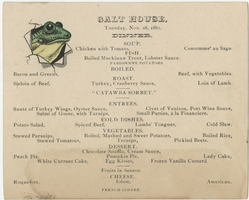Search the Special Collections and Archives Portal
Search Results

Galt House, menu, Tuesday, November 28, 1882
Date
Archival Collection
Description
Text
"Las Vegas: Snapshots of History" Photograph Collection
Identifier
Abstract
The "Las Vegas: Snapshots of History" Photograph Collection is comprised of photographic prints and slides as well as digital surrogates of photographic prints and ephemera representing architecture and events in Las Vegas, Nevada from approximately 1960 to 2017. Materials were donated by members of the Las Vegas community as part of a community scanning day sponsored by the National Endowment for the Humanities' Common Heritage grant. The majority of the collection documents landmarks in Las Vegas including the Stardust Resort and Casino, The Mint Las Vegas, Fremont Street, and the Desert Inn.
Archival Collection
Charles Aplin Photograph Collection
Identifier
Abstract
The Charles Aplin Photograph Collection (approximately 1935-1955) consists of black-and-white photographic prints and negatives. The images primarily depict the Fraternal Order of Eagles, Las Vegas, Nevada chapter events and members. Also included are images of Las Vegas, Helldorado parades, and Conrad H. Mann, former president of the Fraternal Order of Eagles.
Archival Collection
Albert S. Henderson Photograph Collection
Identifier
Abstract
The Albert S. Henderson Photograph Collection (1860s-1959) primarily contains black-and-white photographic prints of Albert S. Henderson and his family. Also included in the collection are photographic prints of Henderson during his tenure as a Nevada legislator and district judge. Other materials include postcards, negatives, and a tintype.
Archival Collection
University of Nevada, Las Vegas Department of Athletics Records
Identifier
Abstract
The University of Nevada, Las Vegas (UNLV) Department of Athletic Records consist of UNLV sports memorabilia, programs, magazines, media guides, and newsletters from the athletics department. The collection has materials documenting both women and men's teams including basketball, swimming and diving, and golf. Other teams include track and field, cheer and dance, and softball. There are also materials that document Jerry Tarkanian's role coaching the men's basketball team.
Archival Collection
Dr. Javier A. Rodríguez oral history interview
Identifier
Abstract
Oral history interview with Dr. Javier A. Rodríguez conducted by Elsa Lopez and Barbara Tabach on December 19, 2019 for the Latinx Voices of Southern Nevada Oral History Project.
Dr. Javier Rodríguez, Biology Professor at the University of Nevada Las Vegas, talks of his personal and educational history that led him to UNLV. He discusses his migration from Puerto Rico to California where he received his PhD from the University of California Berkley and became a biological museum curator for various animal specimens. He later moved to Las Vegas to teach at UNLV where he has now been for nearly two decades; Dr. Rodríguez shares how UNLV has changed since he first started working here, including the university's increased interest in faculty research to become a Top Tier institution. Subjects discussed include: Puerto Rico; University of California Berkley; University funding; Tier 1 research institutions.
Archival Collection
Charles Seals oral history interview
Identifier
Abstract
Oral history interview with Charles Seals conducted by Claytee D. White on July 14, 2017 for the African Americans in Las Vegas: a Collaborative Oral History Project. In this interview, Seals discusses his upbringing in Las Vegas, Nevada and growing up on the Westside. He recalls attending Madison Elementary School, being involved in church activities, and his initial interests in religious ministry. Seals talks about working in the funeral industry, and starting a church in the mid-1980s. Seals recalls the African American church leaders in the Westside and other community leaders at the time. He describes businesses on Jackson Street and recreational activities he participated in. Later, Seals discusses his mother, Rosie Seals, and her involvement in the Welfare Rights movement, being a founding member of the Clark County Welfare Rights Organization (CCWRO), and starting Operation Life. Lastly, Seals talks about the issue of substance abuse, organized crime, and the lack of financial investment into the Westside.
Archival Collection
Therese Thomas oral history interview
Identifier
Abstract
Oral history interview with Therese Thomas conducted by Dennis McBride on March 13, 1995 for the Boulder City Library Oral History Project. In the interview, Thomas discusses her early life in Thistle, Utah before moving to Las Vegas, Nevada in approximately 1931, where her father worked on the Hoover Dam (Boulder Dam) construction. Thomas then talks about her early schooling in Boulder City, Nevada, her experiences as a swing and dance band musician, Block 16 in the Clark Las Vegas Townsite, and her memories of Las Vegas hotels and casinos. Other subjects Thomas covers include Las Vegas entertainers, entertainment venues, and women in the music industry during the 1930s.
Archival Collection
Gerald L. Connor oral history interview
Identifier
Abstract
Oral history interview with Gerald Connor conducted by James Bonnell on February 22, 1977 for the Ralph Roske Oral History Project on Early Las Vegas. Connor first discusses moving to Las Vegas, Nevada and serving as a pilot in the United States Air Force. He then discusses his education at the University of Nevada, Las Vegas and his church membership. Topics that Connor discusses during the interview also include changes in the school district and properties located in Downtown Las Vegas and the Las Vegas Strip, his political activity within the Democratic Party, the Helldorado Parades, and the early atomic tests at the Nevada Test Site.
Archival Collection
Ann Valder Papers
Identifier
Abstract
Ann Valder Papers (1963-1984) include agendas and minutes, programs, invitations, events, and newspaper clippings. The papers are limited to the time Valder spent working for the Review Journal and the Valley Times in Las Vegas, Nevada. The activities covered are her work with Southern Nevada Memorial Hospital and the American Cancer Society.
Archival Collection
